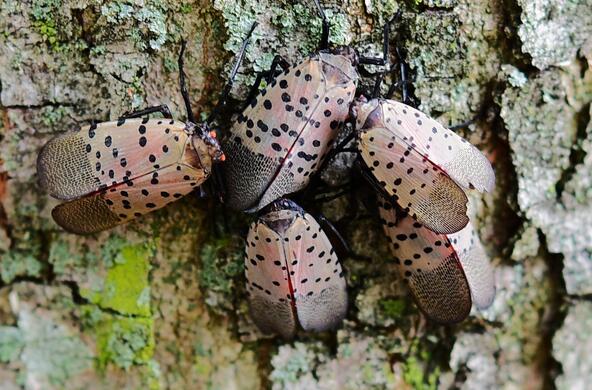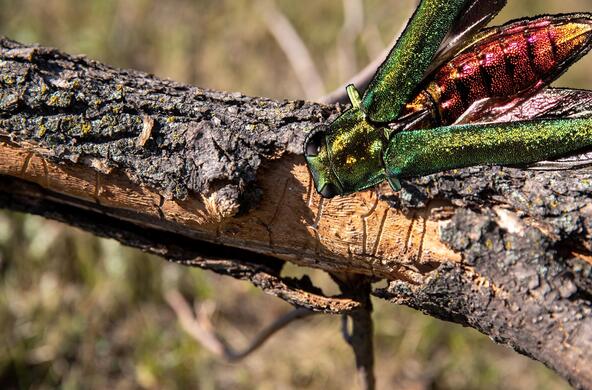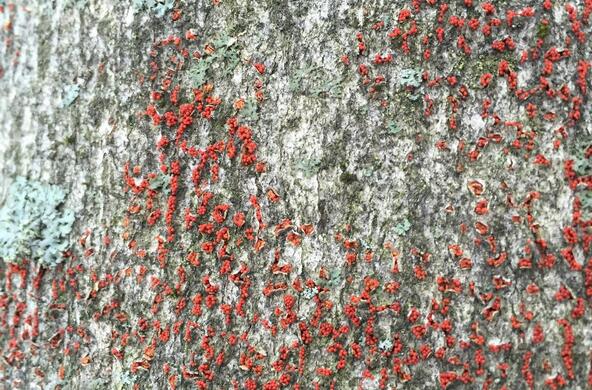A virtual panel discussion on the invasive forest pest problem & how you can help
Imported forest pests are one of the biggest threats facing our nation’s trees. Destructive insects and diseases enter the US via international trade, either in wood packing material, such as shipping pallets, or among live plants. Recent arrivals include: the emerald ash borer, Asian longhorned beetle, and spotted lanternfly.
When we lose trees, we also lose the essential services they perform, such as filtering air pollution, reducing flooding, cooling neighborhoods, providing wildlife habitat, and storing carbon that would otherwise contribute to climate change. It’s an expensive problem, too. Removing and replanting trees killed by forest pests cost homeowners and municipalities billions annually.
Discover why our trees are in trouble, and what you can do to help. This event, moderated by science journalist Gabriel Popkin, features: Gary Lovett (forest ecologist, Cary Institute of Ecosystem Studies), Susan Frankel (plant pathologist, USDA Pacific Southwest Research Station), and Faith Campbell (President, Center for Invasive Species Prevention).
The panel discussion explores the history of the imported forest pest problem, recent challenges, the economics of the issue, the role of horticulture and international shipping, and potential policy and management solutions.
Learn more
During the panel discussion, listeners submitted questions. Due to time constraints, not all were answered live. The panelists collaborated to address these questions; their responses have been posted separately.
Use your voice and take action!
Now that you know how much is at stake, are you ready to help save our trees and #StopForestPests?
Sign (and share) a petition calling on the Agriculture Committees of the House of Representatives and Senate to hold hearings to determine why our current trade policies are not preventing the importation of forest pests and how we can reduce new pest introductions in the future.
Find out what else is being done at Cary to address this threat to our nation's trees; Tree-Smart Trade is a set of science-based policy recommendations designed to tighten regulations on trade and shipping materials and stop the spread of imported forest pests.
Speaker bios:
Faith Campbell is a policy expert and president of the Center for Invasive Species Prevention. She has spent her career as an advocate for biological conservation, working with organizations such as The Nature Conservancy and NRDC. After an initial focus on invasive plants, she shifted her concentration to policy aspects of countering non-native insects and pathogens that attack native tree species, especially in North America. She holds a PhD in politics from Princeton University.
Susan Frankel is a plant pathologist who heads research on sudden oak death at the USDA-Forest Service, Pacific Southwest Research Station in Albany, CA. She also works on understanding how climate change influences forest diseases, preventing pest introductions in restoration areas, tracking forest pest trends, and urban forest health. She has authored hundreds of articles on forest pests and pathogens. She holds an MS in forest pathology and silviculture from the University of Washington.
Gary Lovett is a forest ecologist at Cary Institute of Ecosystem Studies. His research focuses on how forest pests, air pollution, and climate change impact forest health and water quality. He uses modelling and field research in the Hudson Valley, Catskills, and White Mountains of NH to predict forest response to environmental change. He also leads Tree-SMART Trade, a project aimed at reducing imported forest pests. He holds a PhD in plant ecology from Dartmouth College.
Gabriel Popkin is an independent science journalist. Popkin’s writing includes science news, deeper features, and investigative reporting; his pieces have appeared in the New York Times, New York Times Magazine, Science, Nature, Washington Post, National Geographic News, and Smithsonian – among many other leading outlets. Popkin is a past president of the DC Science Writers Association. He holds an MA in science writing from Johns Hopkins University.
The event is sponsored in part by Harney & Sons Fine Teas.






